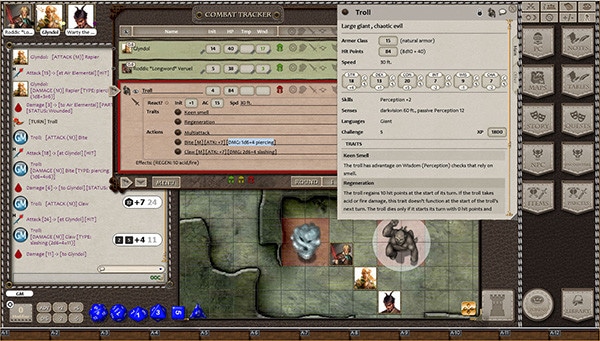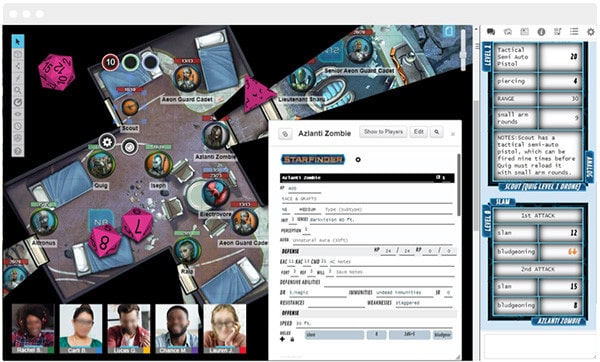
In the RPG virtual tabletop world, there are currently two clear giants in terms of userbase, and arguably, functionality. These are Fantasy Grounds and Roll20. In this article, I am going to do a little comparison shopping on some of the key factors that should be considered when choosing one of these virtual tabletops over the other.
I will begin with a little disclosure. I am a Fantasy Grounds Classic Ultimate License owner, and I run all my RPG sessions on this platform. It was the first RPG virtual tabletop that I was introduced to. (Thanks to Barry at d20adventurer.com). I am still learning to use all its features, and I love it. That being said, I regularly seek out and learn other virtual tabletops to see what options are out there. I believe that Fantasy Grounds and Roll20 are both fantastic choices. I would be happy to play on either.
Supported Role-Playing Games
Both Fantasy Grounds and Roll20 support all the most popular RPGs such as Dungeons and Dragons 5e, Call of Cthulhu, Pathfinder, ETC. These two giants deal with these RPGs in very different ways.
Fantasy Grounds uses fully integrated RPG compendiums (rulesets and data libraries) to create all the necessary game mechanics such as character creation, character sheets, actions, spell effects, dice macros, ETC. This requires little or no additional configuration by the DM or the players to begin playing.
Roll20 does not directly integrate compendiums to create game mechanics. They instead leave the game mechanics completely open to the DM’s understanding and manual configuration. This flexibility makes it very easy to configure Roll20 for any RPG without any additional purchases, but it comes at the cost of being more cumbersome to set up and use at times.
WINNER: Tied. Fantasy Grounds wins for ease of use. Roll20 wins for flexibility although the Fantasy Grounds CoreRPG compendium can be used in a similar way.
RPG Virtual Tabletop Platform
Like so many things between these two giants, they deal with their virtual tabletops in very different ways.
Fantasy Grounds is a standalone application that is downloaded on to the participant’s computers. The DM hosts the session on their computer, and players access that session. Roll 20 is a browser-based application and requires no downloads. The DM hosts the session on the Roll20 servers and players access that session. There are pros and cons to both methods.
The Fantasy Grounds method relies heavily on the quality of the DM’s computer and the internet connection to determine the quality of play as it acts as the game server. Thankfully, this method is not resource-heavy for the DM’s computer and the data transfer between the DM and player’s computers is minimal. This method can require some router configuration to ensure that everyone can get connected which can be difficult if you are not computer savvy.
The Roll20 method relies less on the quality of all participant’s computers and internet connections to determine the quality of play. This method can suffer from lag issues when the number of session users increases and/or the internet connection is slow as there is a lot of data transfer between the participant’s computers and the Roll20 servers.
WINNER: Tied. With a good computer and a good internet connection, both are equal.

Support for Video Conferencing and Music/Sound Effects
Audio and/or video conferencing is a must-have, no-brainer for effective virtual tabletop play. You simply are not going to run a good session through a chat window. I am also a huge believer in the use of music and sound effects to build atmosphere in your gameplay.
When comparing Fantasy Grounds to Roll20 in these areas, Roll 20 is the hands-down winner. Fantasy Grounds has very little integration in these areas. Roll20 has both a built-in audio/video conferencing option and a built-in music/sound effects player. Fantasy Grounds has a few addons available to support music/sound effects, but they do require a fair amount of additional effort to set up and configure.
WINNER: Roll20 kicks butt in this area over Fantasy Grounds, but there are lots of external options to make up for this short-coming.
Support for Mapping and Map Use
Having a great map for use in any RPG session goes a long way in raising the quality of that session. (I know the “theater-of-the-mind” crowd just rolled their eyes.) Both virtual tabletops display maps and images very nicely.
Roll20 has the ability to create some great maps integrated into the platform. This paired with an amazing image marketplace is a very nice feature. All maps used in Fantasy Grounds must be imported. With all the amazing map tools that are available these days, the end product can look the same. The advantage with Roll20 is you can easily modify your map right in the game.
As far as map use goes, both platforms have fog-of-war. Only Roll20 has dynamic lighting.
It should be noted that Fantasy Grounds Unity has stepped things up greatly in this area including integrated map creation and dynamic lighting.
WINNER: Roll20 wins this for now, but I suspect that Fantasy Grounds Unity will bring this one to a tie.

Game Mechanics
Understandably, game mechanics are vital to producing a virtual tabletop that is as good or better than a traditional face-to-face, pen-and-paper session. If poor game mechanics are bogging down the play, everyone will lose interest very quickly.
Fantasy Grounds has chosen the path of integrating, and in many cases, automating all the required game mechanics into their platform to a level unavailable in any other. Dice rolls for initiative, attacks, spells, effects, saves along with their required proficiencies and modifiers are all automated with the click of a button. Character sheets automatically adjust to level increases, damage, healing, effects, encumbrance, and more. There is no other RPG virtual tabletop that has this level of integration and automation. This can help greatly with players that are new or still learning an RPG. They do not need to know all the rules to get going. The game will help them to learn it.
Roll20 can achieve some of this integration and automation, but it requires a lot of setup, configuration, time and knowledge of the rules for each RPG that you want to play.
WINNER: Fantasy Grounds. I will admit that if you don’t like having the game take care of so much of the game mechanics for you that you would disagree. I find that it frees me up to get more into role-playing.
Cost
Both Fantasy Grounds and Roll20 have free and paid options but comparing the two is no easy task as the pricing and options are so different. Here are links to both so you can compare for yourself.
Fantasy Grounds Pricing | Roll20 Pricing
The big difference to me is in what a free account offers and long-term costs. You can certainly do more with a free Roll20 account which could lead you to never require an upgraded account. If you do decide that you need the options available in an upgraded account, Fantasy Grounds is cheaper in the long term. Pricing for compendiums is, for the most part, the same.
WINNER: FREE – Roll 20
WINNER: UPGRADES – Fantasy Grounds
I hope that this comparison helps to give you some additional insight into these two RPG virtual tabletops. Both companies have a fantastic product and an equally fantastic community. As I mentioned in the beginning of this article, I would be happy to play on either.





Leave a Reply